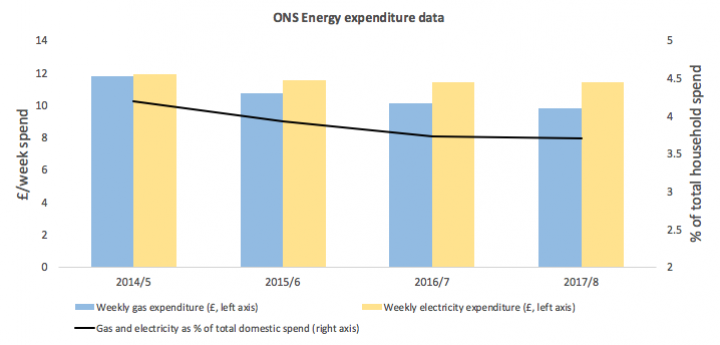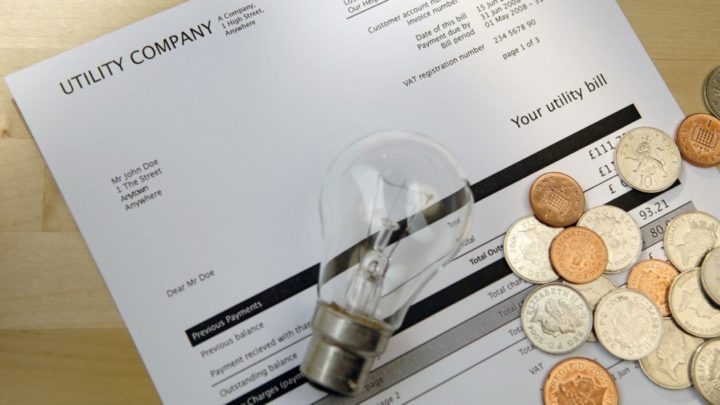Soaring energy bills – where is the evidence?
Energy bills are not going up; new ONS data adds to the weight of evidence
By Jonny Marshall
Share
Last updated:
Energy bills are not going up.
Sounds like an odd thing to say – especially a couple of weeks after the introduction of the energy price cap, and announcements that more people are switching suppliers than ever before to avoid surging prices.
And set against the long-held school of thought that it would cost more to power the nation renewably than from fossil fuel sources, it may seem even more surprising.
But it is true.
Now, new data on household spending from the Office for National Statistics adds even more weight to the notion that the shift away from dirty energy is not hitting UK billpayers in the pocket.
Released in late January, the most recent ONS data shows that during the 2017/18 financial year (FY17/18), the average weekly spends on gas and electricity were £9.80 and £11.40, respectively (Figure 1).

With total weekly domestic expenditure averaging £572.80 in each home across the nation, these figures each represent less than 2% of household spending. And while the average spend on electricity has increased by 30p per home compared with the previous financial year, they are significantly lower than just a few years ago.
In fact, since FY2014/15 (the oldest detailed ONS data available), the amount spent by all British homes on gas and electricity has fallen by 9%, down £57million to £576 million. Energy bills have also fallen as a proportion of total household spending, down from 4.2% to 3.7%.
And while figures from 2014 were pushed up by high fossil fuel prices, since then domestic expenditure on energy has been virtually constant, as Figure 1 shows.
More renewables, higher bills?
When compared to ‘warnings’ that sourcing more energy renewably would lead to higher bills, these figures make for interesting reading.
Back in 2014, coal accounted for 30% of British electricity, with a similar proportion from gas. Wind provided 9.5% of our power, and solar just 1.2%. Fast forward to 2017, however, and coal generation had fallen to less than 7% of the total, with wind and solar output virtually doubling to nearly 20% of electricity output.
It’s not just the cost of generation, we were warned, but also the cost of balancing a grid that increasingly leans on intermittent renewables that would force households to pay ever more for the energy they consume.
Yet, looking at the numbers, it is clear that these warnings are not in line with what is happening on the ground.
In truth, the success of energy efficiency measures in curbing how much energy we use has more than offset any price rises. Better-performing gas boilers, better insulated and less draughty homes, and more efficient products and appliances are all contributing, applying downward pressure on household energy bills.
The CCC found that efficiency measures have shaved £290 from the typical household energy bill each year since 2008, more than offsetting the social and environmental levies that fund renewable power and support for low-income and vulnerable households.
Message not getting through

Unfortunately, this good news story isn’t really being heard, especially by those controlling policies that affect how many of our hard-earned pounds it takes to run our homes.
Polling of MPs last year showed that 89% of our sitting politicians thought that energy bills had increased over the past decade. Just 8% thought that bills were falling.
And it’s hard to blame them really; for years society has been confronted with a deluge of stories from switching websites and challenger energy companies with an interest in the notion of spiralling bills. When added to comments that more renewables would lead to higher bills, anyone with only a passing interest in the energy sector would be excused for thinking bills were only going higher.
However, we can be hopeful that the tide is beginning to turn. Figures released at the start of the year that showed electricity demand is down to a level last seen in 1994 spawned a host of comment pieces on the merits of curbing consumption as a means of keeping bills down.
Not only this, but energy minister Claire Perry has begun to make the point in Parliament; a voice that will hopefully help to get the message across. Alongside other stats – the UK cutting carbon fastest of all G7 nations and the plummeting cost of offshore wind, to name just two – the minister is in prime position to nix the notion that more low carbon energy means higher bills.
The ONS data adds to that from BEIS, from the CCC and from Ofgem, all of which tell the same story, and hopefully one that will gain more traction soon.
Share